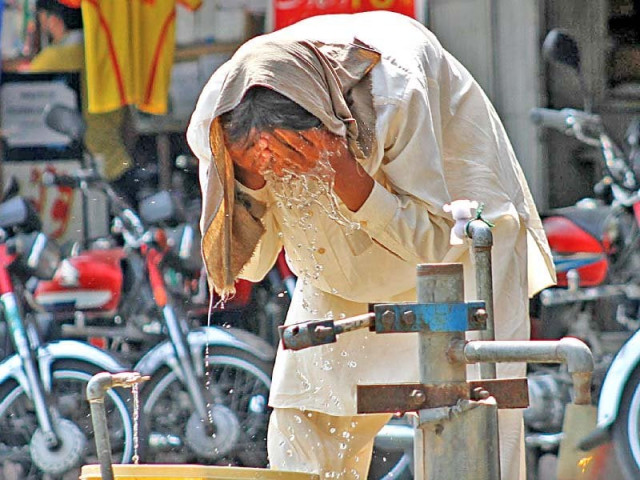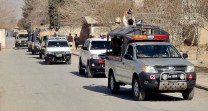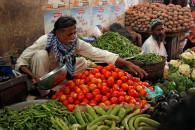Heat wave: Under scorching sun, Pakistan swelters
Max temperature recorded at 49°C in Sibi and Larkana; Karachi sizzled at 44.8°C

A man smears his face with water from a public tap in Islamabad. PHOTO: INP
This summer is turning out to be one of the hottest in the history of Pakistan. On Saturday, many cities sizzled and sweltered under the scorching sun throughout the day as temperatures soared as high as 49 °C in Sibi and Larkana districts, while five people – among them three children – died and many more fainted due to the hot and humid weather. Karachi’ites, too, braved a sweltering day as the mercury shot up to almost 45°C in the metropolis.
Weather forecasters, however, predicted that the first spell of pre-monsoon rains could begin soon in northern Pakistan – including Azad Kashmir, Rawalpindi, Islamabad, Sargodha, Lahore, Gujaranwala, Malakand, Peshawar, Hazara, Kohat, Bannu and Fata – and continue for four to five days. This will help lower the overall temperature and provide some respite from the sweltering heat. This weather pattern, according to Dr Ghulam Rasool, the director general of the Pakistan Meteorological Department, will gradually move towards the south and bring moderate rain in Sindh and Balochistan between June 23 and 26.
Karachi heat wave
In Karachi, the temperatures rose to 44.8°C. And, according to the latest forecast, the weather will remain hot/very hot and dry during the next 24 hours. Dr Rasool attributes the soaring temperatures in the port city to a low pressure which developed in the Arabian Sea near the Indian financial hub of Mumbai and sucked in all the winds blowing towards Pakistan. Nonetheless, he says the temperatures will start dropping from Sunday (today) and subsequently will bring some rain prospects for Karachi’ites.
Maximum temperatures
Sibi and Larkana braved the hottest day of the season where the maximum temperature was recorded at 49°C. The scorching heat adversely affected the routine life and several cases of sunstroke and sunburn were reported in the two districts. The Larkana district health department distributed handbills and fliers to inform common citizens about precautionary measures against sunstroke and other heat-related complications.
In Sibi, one person died and five fainted due to the extreme hot weather. The city wore a deserted look as most shops and markets remained closed around mid-day and people preferred to stay indoors. Other areas of Balochistan affected by heat wave included Bakhtyarabad, Dhadar and adjoining areas. No respite is in sight from the heat wave as weather forecasters predicted hot to very hot weather with chances of scattered dust storms in parts of the province. However, there are chances of thunderstorm/rain with gusty winds in Kalat, Quetta and Zhob divisions.
Deaths reported Tharparkar
Speaking to The Express Tribune by phone from Tharparkar, a health official said one man and one infant died due to heatstroke in the Civil Hospital, Mithi, while two children, aged six and eight years, died in the Korean Hospital Chachhro. The two children died of severe dehydration caused by the sweltering heat, he said, adding that the desert district has been without electricity since Friday evening.
Impact of climate change
A former director general of the Pakistan Environmental Protection Agency, Asif Shuja, attributed the current increase in temperatures to the impact of climate change on the country. “There has been a rise in the Earth’s average temperature from 15.5°C to 16.2°C over the last 100 years due to which we are experiencing such extreme weather conditions both in summers and winters,” he added.
The rapid increase in urbanisation, construction of high-rises, deforestation and growing number of road vehicles are also contributing the climate change, Shuja said. “The last 30 years – from 1993-2012 – had been warmer than the last 1,400 years. Scientists envisage a rise of 1-6.67°C in temperature till 2100 which will be disastrous,” he warned.
Shuja further said that Pakistan lacked the technology to predict extreme weather events which caused human and material losses.
So far the hottest year globally
Data revealed by the National Aeronautics and Space Administration (NASA) on June 16 shows that global temperature in the first five months of 2015 have been the hottest ever recorded, with May pushing the mercury to the highest.
The report says May was 0.71°C above the long-term average. Following the climatic patterns over the next year, there are ample chances this year may go on to set an all-time new record. In fact, the year has been no less than 0.1°C hotter than the previous one, the former being the hottest itself as recorded.
Published in The Express Tribune, June 21st, 2015.



















COMMENTS
Comments are moderated and generally will be posted if they are on-topic and not abusive.
For more information, please see our Comments FAQ